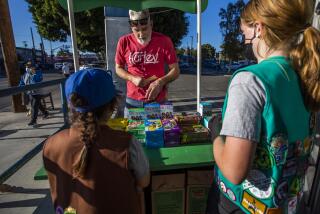Scouts’ Father Chokes Back Tears in Final Arguments : Trial: He likens the religious discrimination he said his sons are facing to the racial bias blacks have suffered. Scouting program counsel reiterates argument that allowing atheists in would undermine principles.
- Share via
SANTA ANA — The father who is representing his twin sons in their religious discrimination lawsuit against the Boy Scouts of America fought back tears Monday as he asked a judge to give his sons the right to “put on the uniforms which they once so proudly wore.”
But an attorney for the Boy Scouts countered that allowing William and Michael Randall of Anaheim Hills back into the Cub Scouts would “profoundly impact” the Scouting program and undermine its basic principles and values.
Orange County Superior Court Judge Richard O. Frazee Sr. listened intently as the attorneys presented their final arguments and summarized the evidence, which has included reams of documents and a seemingly endless list of witnesses, from young Cub Scouts to atheists and religious leaders.
“About the only witness not called to the stand,” one court observer quipped during the six-weeklong trial, “was God.”
At the end of the day, Frazee took the case under submission. He has 90 days to issue his ruling. A decision in favor of the two 10-year-olds who refuse to say the word God in the Cub Scout Promise could have widespread implications for the 80-year-old institution and force the admission of atheists into Scouting.
Despite the important issues in the case, the trial has been marked by bickering and derisive comments between the attorneys. The judge has frequently scolded them for unnecessarily prolonging the proceedings.
Attorney James Grafton Randall, who is representing his sons in their lawsuit, asked the judge to ignore all the irrelevant issues and get to the heart of the matter.
“This case,” Randall said, “is not about what someone or a whole bunch of someones may think about me either as a lawyer or a father . . . (or) whether or not one likes the two plaintiffs in this case.”
What it is about, both sides agree, is whether the Orange County Council of the Boy Scouts of America is bound by the state’s Unruh Civil Rights Act, which says no “business establishment” can discriminate on the basis of “sex, race, color, religion.”
The Randall boys filed suit last February, claiming that they were illegally expelled from their Anaheim Hills Cub Scout den because they don’t know what God is and refuse to swear an oath to him. They are seeking only to be allowed back into the Cub Scouts.
Attorneys for the Boy Scouts maintained throughout the trial that the organization is a private institution with the constitutional right of “freedom of association” and can exclude boys like the Randalls who do not believe in God.
To admit nonbelievers, Boy Scout attorney George Davidson said, would cause “a significant interference with the basic values that brought the group together.”
“Boys Scouts is not out to convert boys into believing in God. . . . It’s a vehicle for reinforcement of religious beliefs,” he said.
Davidson referred to testimony of parents and Scouting and religious leaders who said that a “duty to God” was essential for participation in the program.
Randall, however, pointed out that much of the organization’s own literature is ambiguous on the subject of God, does not define God and does not expressly state that atheists are automatically prohibited from joining.
Even if such a policy did exist, Randall said, there is plenty of evidence to show that the organization is actually a business and prohibited by state law from discriminating.
He said the Orange County Council of the Boys Scouts of America has about 55 paid employees, an operating budget of more than $4 million, owns or leases real estate, and runs two shops that sell everything “from backpacks to propane appliances, from belt buckles to Oscar de la Renta-designed scarfs.”
Randall also pointed out the testimony of several boys in Anaheim Hills Den 4, to which the Randall twins once belonged, who said they did not know what “duty to God” meant. One youth had testified that he thought it meant “to do all your chores.”
Randall likened the religious discrimination he said his sons are facing to that suffered by blacks who had to “sit in the back of the bus or not drink from the same fountain as white people.”
As he choked back tears, Randall pointed to a blue Cub Scout shirt and told the judge that his sons wanted to wear the uniform again and “be back with their friends in the Scout program.”
Key Arguments in Scout Trial
Final arguments were made Monday in the trial of Randall vs. Orange County Council, Boy Scouts of America, in which twin Anaheim Hills boys allege that they were expelled from their Cub Scout den because they do not believe in God. Here are some key points attorneys on both sides presented:
PLAINTIFF
The state’s Unruh Civil Rights Act, which prohibits a “business establishment” from discriminating on the basis of religion, applies in this case.
The defendant is a business for a number of reasons, including a multimillion-dollar budget, paid staff, ownership of property, and operation of two Scouting merchandise stores.
The organization’s own literature does not define God or a duty to God . Nor does the literature expressly state that atheists are automatically excluded.
DEFENDANT
The organization is a “private association” and the Unruh Civil Rights Act does not apply.
Even if the Unruh Civil Rights Act does apply, there is no “compelling state interest” to force the organization to change its policy.
Religious principles are fundamental to the “Scouting movement” and have been part of the program since it was started.
More to Read
Sign up for Essential California
The most important California stories and recommendations in your inbox every morning.
You may occasionally receive promotional content from the Los Angeles Times.










